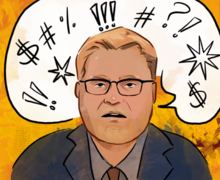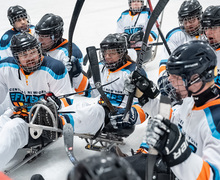LGBTQ Community discusses response to viral video
In the wake of the viral video that shows women’s soccer player Hanna Strong using derogatory language, some members of the LGBTQ community at Syracuse University are saying the incident should lead to a dialogue on campus about identity.
Strong, a senior midfielder on the SU women’s soccer team, was recorded calling an unknown person a “f*ggot-a** n*gger” in a video that was posted online Saturday and went viral. Head coach Phil Wheddon suspended Strong from the team the same day, and an active investigation by the university is underway.
While many students responded in outrage, some in the lesbian, gay, bisexual, transgender and questioning community are saying the event can be used to create discussion among members of the university community. Angela Diaz, a junior sport management major and the director of public relations for Pride Union, said she first saw the video when a friend showed it to her Saturday.
“My initial reaction was disappointment, not disbelief,” she said. “Because this type of speech happens a lot on campus.”
Molly Mendenhall, a senior women’s and gender studies major and president of Pride Union, added that she also hears language like what was said in the video on campus nearly everyday. Mendenhall said the video has created plenty of discussion in the university community, but she said that type of discussion hasn’t occurred much in her time at SU.
“This is really the first campus-wide dialogue that has happened since I’ve been here, and I’m a senior,” she said.
Moving forward, Mendenhall said Pride Union will be talking with other organizations about how the video affects communities on campus beside the LGBTQ community. In addition, she said the group hopes to participate in the forum that was mentioned in Chancellor Kent Syverud’s email on Sunday to the campus community.
Michael Riley, the associate director of the LGBT Resource Center, said he believes many students are coming together in the aftermath of the video to “reframe the culture that allows this type of thing to happen.” He added that various campus offices have released statements and some students have been doing their part to work toward making students on campus feel safe and secure regardless of their racial or sexual identity.
Both Mendenhall and Diaz said they believe Strong’s comments have sparked a large response because she is a student-athlete. As a result, more people are paying attention and more people are discussing the issue of the hurtful language that was used.
Mendenhall added that she thinks the conversation should shift away from just the one instance with Strong in order to start a larger conversation.
“We need to start a dialogue about the culture that allows words like this to be used this way,” Mendenhall said.
In addition, the words Strong chose have provided an opportunity to discuss identity and where certain identities intersect. Riley said it’s important to consider that people associate with more than just one identity, whether it’s based on race, sexual identity or something else.
“I hope the situation highlights the importance of having an intersectional lens when you’re dealing with marginalized identities,” Riley said.
Diaz and Mendenhall both added that they’re hopeful that in the wake of the video, there can be a conversation among people on campus in order to get to the root of the issues brought to light by the video.
“I hope it creates more open and respectful dialogue between not only students on campus but also faculty, staff and the community,” Mendenhall said. “We need to be able to talk about where these issues come from.”
Published on September 10, 2014 at 12:01 am
Contact Brett: blsamuel@syr.edu | @Brett_Samuels27





